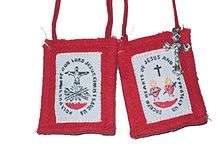Fivefold Scapular

The Fivefold Scapular is a sacramental made up of the five most popular scapulars in the Catholic Church: the Brown Scapular, the Blue Scapular, the Black Scapular, the Red Scapular, and the White Scapular.
The Brown Scapular
The Brown Scapular (also known as the Scapular of Our Lady of Mount Carmel, or simply as the Scapular) is the most popular scapular. Given to Simon Stock by Our Lady of Mount Carmel, she promised him that "whoever dies clothed in this scapular shall not suffer the eternal flames." Later, she appeared to Pope John XXII as the Mediatrix of all graces, promising him that "whoever shall wear my Scapular faithfully, pray the Divine Office [various indults have applied in the past and apply today], and exercise chastity in their state of life shall not suffer Hell, and if they should go to Purgatory, I shall bring them to Heaven on the First Saturday after their death." (Sabbatine Privilege).
| Part of a series on |
| Scapulars of the Catholic Church |
|---|
Sacramental garments |
| General |
| Specific scapulars |
|
|
|
The Brown Scapular has been praised by numerous popes. Venerable Pope Pius XII said that the Brown Scapular is "a sign of consecration to the Immaculate Heart of Mary" and that "the scapular is not superstitious... One is not saved from Hell merely by wearing it. No, for it is a sign that they must live their lives in total obedience to God and trust in him, through and with the Immaculate Heart of Mary." In 1917, Mary appeared as Our Lady of Fatima, holding not only the Rosary but also the Brown Scapular. Moreover, in her final apparition, during the Miracle of the Sun, one of the three seers, Lúcia Santos, saw Our Lady of Mount Carmel. Furthermore, it was to St. Dominic that Mary appeared with the Rosary and the Brown Scapular, her arms outstretched (a gesture of prayer), saying, "One day by the Rosary and the Scapular I will save the world." Finally, the members of the Blue Army of Our Lady of Fatima wear the Brown Scapular as a sign of personal consecration to Our Lady of Fatima.
The Blue Scapular of Immaculate Conception
The Blue Scapular of the Immaculate Conception is due to Venerable Ursula Benicasa, founder of the Order of Theatine Nuns, when a group of wealthy young women who had given up their wealth in order to live for Jesus Christ had wanted to honor the Immaculate Conception of the Blessed Virgin Mary. The Virgin Mary had promised Benicasa that whoever wore her Scapular would be under her special protection and receive special graces through her maternal intercession. The Blue Scapular was highly praised by Clement X.
The Black Scapular
The Black Scapular (also known as the Scapular of the Seven Dolors of Mary) was revealed to Alexander IV shortly after he had sanctified the Servite Order in 1255. Our Lady of Sorrows had promised that whoever meditated upon her seven dolors would receive her special protection at the hour of death.
The Red Scapular
The Red Scapular of the Passion was revealed to Sr. Appoline Andriveau, a Sister of Charity of St. Vincent de Paul in 1846. The Lord promised that whoever wore his Scapular he would grant a great increase of faith, hope, and charity every Friday (the office day of the Passion). The apparition was repeated several times, and in the following year, Pope Pius IX sanctified the sacramental on June 25, 1857.
The White Scapular
The White Scapular of the Most Holy Trinity is the usual habit of the Secular Third Order of the Most Holy Trinity and is worn also by members of the Confraternity of the same Order (the Trinitarians). St. John de Matha during his first Mass (around 1193) had a vision of Christ between two captives (http://www.trinitari.org). The Christian captive had a staff with a red and blue cross on the top in the Greek form (+). From this vision he founded the Order of the Holy Trinity and Captives (the Trinitarian Order) whose charism was to liberate Christians taken into captivity by the moors and to glorify the Holy Trinity (today it is still seeking the glory of the Holy Trinity and the liberation of captives).
References
- The Trinitarian Order by Fr. Andrew Witko 2007 Rome/Cracow
- 1925 Constitutions of the Third Order of the Most Holy Trinity
- The White-Red-Blue Scapular Archconfraternity of the Most Holy Trinity Published by the Order in 1947